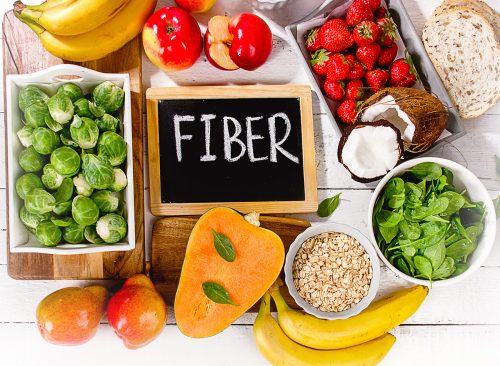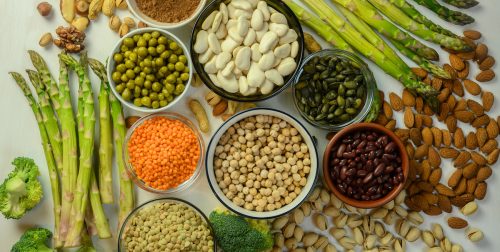16 Supplements That Are a Waste of Money, Say Experts
It's better to get your nutrients from whole foods than these.

An estimated 86 percent of adults in the U.S. take a vitamin or supplement, according to a 2019 poll done by the American Osteopathic Association, but that doesn’t mean they’re healthier for it. The same poll states that only 24 percent of “those taking vitamins or supplements received test results indicating they have a nutritional deficiency.” With thousands of products on the market, it’s challenging to know which supplements are right for you and which ones to avoid, so Newsful talked with specialists who shared their expertise on key supplements that are a waste of money. Dr. Michael Hirt, a Board Certified Nutrition from Harvard University and Board Certified in Internal Medicine and is with The Center for Integrative Medicine in Tarzana, California, breaks down the supplements to avoid and reveals why they don’t have the health benefits you think.

“Promoted as an aid to the ketogenic diet, raspberry ketones are the compounds that give raspberries their unique aroma but actually have nothing to do with weight loss associated with ketosis,” says Dr. Hirt. “Consumers may also believe that raspberry ketones come from raspberries given the name, but they are artificially manufactured in a lab, not from natural raspberries. Either way, they don’t work and have never worked for weight loss or metabolism.”

“Everyone knows that zinc is important for immune health, and sales of this mineral have soared during the pandemic as the World tries to defend itself against the viral predator,” says Dr. Hirt. “Consumers can find zinc in many forms, but not all zinc supplements provide this important mineral in a form that can be easily absorbed. Zinc oxide is an inexpensive form of zinc, so lower quality supplements will often use it in their vitamin formulas. Savvy consumers will recognize zinc oxide as one of the main ingredients in sunscreen, which works great for your skin but not so well for your immune system. As you can imagine, your stomach would have a tough time trying to get the zinc out of the same stuff used to make sunscreen. If you are looking to get more zinc into your body, don’t eat more sunscreen, but find a ‘chelated’ zinc supplement which is much better absorbed.”

“This weight loss supplement was popular in the ’90s and fell out of favor because it just didn’t work,” says Dr. Hirt. “But recently, it has made a comeback, being marketed to those consumers who forgot that it was worthless or had never heard of it. Only rat studies have shown that Garcinia causes weight loss, but reliable evidence never existed for humans. So, if you are three inches tall, white, and furry, this supplement could be just the ticket for you. Otherwise, it’s a pass.”

“This tropical herb was used as a ceremonial beverage to share with visitors from neighboring islands, the equivalent of the indigenous ‘peace pipe.’ Kava induces a state of deep relaxation and as a supplement, was marketed as the perfect ‘chill pill.’ Unfortunately, kava can cause serious liver abnormalities when ingested, and consumers are best served to find safer ways to channel that ‘island vibe,'” says Dr. Hirt.

“This herb can be found in many sexual enhancement formulas because it contains the active ingredient, yohimbine, a potent stimulant of male interest and performance. Unfortunately, yohimbe can also overstimulate your heart, jack up your blood pressure, and create more anxiety than Covid. Which means that using yohimbe will make it more likely for you to end up in the emergency room than the bedroom,” says Dr. Hirt.

“Vitamin E actually belongs to a family of vitamins called tocopherols,” says Dr. Hirt. “Your body needs these nutrients for optimal health and wellness. Your intestines absorb tocopherol by using a receptor that carries these nutrients from your food into your blood. When you take a supplement of just vitamin E (without any of the other tocopherols), the vitamin E molecules will fill all of the receptors and block the naturally occurring food-based tocopherols from also being absorbed. Researchers have shown that these inadvertently blocked tocopherols are even more important to your good health than just vitamin E. Studies consistently show that eating foods rich in tocopherols (like oat bran, coconut, pistachios, and paprika) is beneficial, but the taking of vitamin E by itself is not.”

“We all know melatonin is the hormone our brain makes to help us sleep. As we age, the brain’s pineal gland makes less and less melatonin,” says Dr. Hirt. “So, for those of us over the age of 50, taking a melatonin supplement can be very beneficial for sleep and to reduce the risks of vascular disease, dementia, and bone loss. However, as a physician, I see many parents giving this hormone to their children to help them sleep. Supplementing younger children and adults with melatonin can impair the brain’s ability to make its own supply. Parents are often surprised to learn this, thinking that they are doing a good thing by giving their kids melatonin as a sleep aid. Better is to allow the child’s brain to make its own supply of this important hormone by improving sleep hygiene: no screen use in the bedroom, blackout the room, and deep breathing exercises to calm the mind for sleep.”

Many people add a multivitamin to their daily routine, but Megan Mescher-Cox, DO, Board Certified in Internal Medicine, Lifestyle Medicine, and Obesity Medicine, explains why you should rethink that and why other popular supplements aren’t beneficial healthwise. “Adding a multivitamin does not add to your health,” she says. “In fact, studies have found that individuals who take multivitamins actually have a shorter lifespan. Of course, this can be due to many factors, and it is hypothesized that individuals with less-healthy lifestyles or who have medical conditions end up supplementing more often, accounting for the findings, but overall, spending your money on real, whole foods that are rich in vitamins have more health benefits than a multivitamin.”

“Natural fiber is incredibly healthy – the fiber is found in whole plant foods such as vegetables, fruits, beans and lentils and whole grains, and the benefit of fiber cannot be understated!” says Mescher-Cox. “Increased fiber intake is associated with lower rates of colon, breast, and prostate cancers, less heart disease and dementia, less diabetes, high blood pressure, and lower cholesterol levels, amongst many other benefits! But this is for fiber in its NATURAL form. Taking a fiber supplement may help with constipation, but the additional health benefits are only found in the real deal.”

“Collagen has become quite popular as a supplement recently, although it has been around for decades,” says Mescher-Cox. “Some people don’t know that collagen supplements are powdered ligaments, tendons, and bones of animals, although there are also some rare non-animal varieties as well. Your body has the ability to make collagen—and does it readily if provided the building blocks to make collagen and, even more importantly, if we do not continue to damage the collagen we currently have. The best way to support our natural collagen growth (and prevent breakdown) is a diet high in antioxidants and to avoid inflammatory foods. Antioxidants are found in high concentrations in herbs, spices, and vegetables. Getting plenty of rest and minimizing stress also keeps natural collagen as healthy as possible.”

“Over the last many decades, protein supplements have skyrocketed in popularity. But we are not a country that suffers from protein deficiency,” says Mescher-Cox. “In fact, it is rare to see a patient with protein deficiency that is not dealing with an underlying health problem (in which case the individual needs clear instruction from their physician). A cost-effective and more healthful protein source is from legumes—beans, lentils, and peas. These plant-based proteins are whole foods, and you get the benefit of the natural fiber, antioxidants, nutrients, and minerals from the protein.”

“B-complex vitamins have grown in popularity partly due to the energy boost they provide when ingested,” says Mescher-Cox. “Clinically, though, I have seen multiple patients who have neurologic symptoms from excessive vitamin B6 intake, most often coming from a B-complex vitamin. It is extremely rare to have high levels of vitamin B6 unless an individual is getting it from supplements and it is important to watch for other vitamin B6 intake as it is added to energy drinks or other supplements. There are many B vitamins with health benefits, and a well-rounded, nutrient-dense diet will provide these B vitamins. There is some evidence for certain B vitamins to lower the incidence of migraines, but this is patient-specific. It is also important to note vitamin B12 supplementation can be critically important to individuals who are on a fully plant-based diet or who are identified to be low in vitamin B12.”

“Krill Oil is made from tiny shellfish and usually taken as capsules. It contains Omega 3, 6, and 9 fatty acids,” says Mescher-Cox. “Omega 3 fatty acids are anti-inflammatory and provide health benefits, but the omega 6 and omega 9 fatty acids are pro-inflammatory, and it is recommended to limit consumption so best to avoid this supplement that can increase inflammation. The Omega-3 fatty acids that many people commonly refer to as “fish oil” are actually synthesized by algae and can be sourced directly from algae, which has increased EPA and DHA fatty acids, which are especially helpful for brain health. Omega-3s can also be found in flax seed (although it is important to ingest the ground version, flax seed meal, in order to get the benefit), chia seeds, and hemp seeds in the ALA version, which your body then converts to DHA and EPA.”

“Another popular item in the last many years, bone broth comes from soaking bones and connective tissue from animals in water to extract the collagen,” says Mescher-Cox. “The danger comes from the ability of heavy metals to leach out into the broth, notably lead. The health benefits are lacking, and money is better spent on whole plant foods. Please keep in mind that vitamins or supplements can be life-saving if the individual is in need of that specific vitamin or supplement, but it is dose and patient-specific. Please talk to a doctor about your individual health needs, and remember that supplements should be approached with the same vigilance that someone would have when researching a pharmaceutical medication before starting it. Additionally, supplements are not FDA regulated and have been found to not even have the stated ingredients in the actual product.”

“Calcium supplements used to be widely taken – and recommended by the medical community – for bone health, but later research proved that calcium supplementation to more cardiovascular events,” says Mescher-Cox. “Calcium supplementation has been widely used for bone health, but supplementation has not been shown to decrease the risk of hip fractures, which are the fractures that result in the most shortening of life. They come with risks as well. In 2010, a meta-analysis on calcium supplementation concluded that calcium supplementation is associated with an increased risk of myocardial infarction (heart attack). Of note, getting calcium from food was not associated with an increased risk of myocardial infarction. So ideally increasing calcium-rich foods in the diet and if calcium must be supplemented for it to be individualized and at a low dose.”

It’s not only adults taking daily supplements. Children often take vitamins, but Dr. Richard Cabrera, MD, Pediatrician for BeverlyCare in Montebello, says that isn’t necessary if kids are eating properly. “In general, children who eat a well-balanced diet do not need multivitamin supplementation. There are some children with selective diets (due to food sensitivities or vegetarians) who may need a daily multivitamin to meet their recommended dietary allowance (RDA). The American Academy of Pediatrics (AAP) acknowledges that taking a multivitamin won’t do any harm as long as it doesn’t exceed the RDA for any mineral or vitamin. When in doubt, parents should be encouraged to discuss the diet and development of their child with their pediatrician.”
RELATED: 90% of People Who Die From COVID Have This in Common

“Overall, I recommend to my patients that they focus on getting their nutrients from whole foods,” says Mescher-Cox. “Your body is perfectly designed to extract the nutrients from foods that you ingest, and it does not recognize megadoses of vitamins. Moreover, more than 75% of us are deficient in fruit and vegetable intake, so I recommend to my patients to ditch the supplements and instead focus on getting the body what it really needs: good old fruits and vegetables, beans and lentils, whole grains, nuts, and seeds.”The same goes for kids. Instead of giving a child supplements, try adding essential nutrients to their diet first. Dr. Cabrera says, “The most important aspect of proper child development and brain development is to ensure that the child is receiving proper nutrition. Macronutrients (fats, carbohydrates, protein) sufficiency is essential for normal brain development, and undernutrition can lead to a failure to thrive and may have a substantial effect on neurodevelopment. Along with macronutrients, key nutrients that support neurodevelopment include zinc, folate, iron, choline, iodine; vitamins A, B6, B12, D, and long-chain unsaturated fatty acids.”














